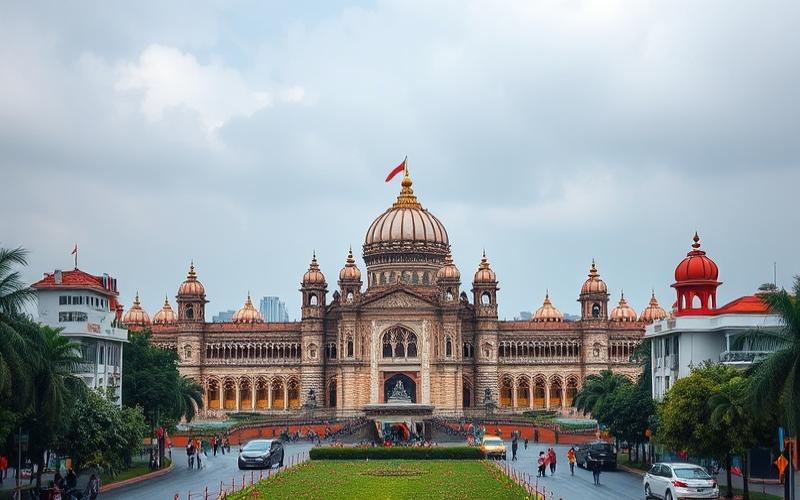
 Published on and written by Cyril Jarnias
Published on and written by Cyril Jarnias
Relocating to India is a fascinating adventure, but when traveling with four-legged companions, it can quickly become a complex challenge. Navigating the regulations for importing pets into India requires careful planning, precise knowledge about quarantine, and preparation of essential official documents. It’s crucial to understand the country’s specific requirements, such as health certificates and required vaccines, to ensure your pet’s well-being throughout the process. This article provides practical tips and key steps to simplify your move and guarantee your precious companion a smooth journey to this new host country.
Preparing Your Departure with Your Pet to India
Steps to Obtain Travel Documents for Pets to India:
1. Identification and Vaccination
- The animal must be identified by microchip (or readable tattoo applied before July 2011).
- It must be vaccinated against rabies: vaccination possible from 12 weeks and valid 21 days after injection.
- An up-to-date vaccination record and a European identification passport are required.
2. Certificates and Authorizations
- Obtain a health certificate (“veterinary health certificate”) issued by an official veterinarian within 10 days before departure.
- Apply for a no objection certificate (NOC) from the Indian government’s AQCS service within 7 days before departure.
- All documents (originals and copies) must be kept and presented upon arrival.
3. Additional Documentation
- Prove that the owner has resided abroad for more than 2 years and is moving to India (visa, job offer, etc.).
- The owner’s name must be identical on all documents and flight tickets.
- Import limit: maximum 2 dogs or cats per person.
Quarantine Procedures Upon Arrival in India:
- Unless exceptional, the animal is handed directly to its owner after landing.
- The animal must observe quarantine at the declared residence address (owner’s home).
- Veterinary checks may occur during this quarantine.
Indian Legislation on Domestic Animal Import:
| Requirement | Detail |
|---|---|
| Maximum number of animals | 2 dogs or cats per person |
| Identification | Mandatory microchip |
| Vaccination | Rabies mandatory, other vaccines recommended |
| Required certificates | Health certificate, NOC issued by AQCS |
| Owner status | Residence abroad for 2 years, proof of relocation to India |
| Quarantine | At home, under Indian authorities’ supervision |
Preparing Your Pet for Travel and Adaptation:
Before Departure:
- Accustom the animal to its carrier several weeks before the flight.
- Provide an IATA-approved, comfortable, and well-ventilated carrier.
- Ensure the animal is in good general health and up-to-date on all vaccines.
- Plan breaks and provide water for the journey.
Comfort During the Flight:
- Place a blanket or familiar item in the carrier.
- Use calming pheromone diffusers or sprays (with veterinary advice).
- Limit food before the flight to prevent motion sickness.
Adapting to the Indian Climate:
- Prefer cooler hours for taking the animal out.
- Monitor hydration and avoid prolonged heat exposure.
- Protect the animal from local parasites with appropriate treatment.
Veterinary Advice to Minimize Stress:
- Avoid sedatives unless expressly prescribed by a veterinarian, as they can be dangerous on planes.
- Prefer natural solutions or mild anxiety medications.
- Conduct a complete health check before departure.
- Prepare a suitable first-aid kit (anti-parasitics, bandages, etc.).
Recommended Airlines for Pet Transport:
| Airline | Favorable Conditions for Pets |
|---|---|
| Air Canada | Cabin or cargo transport, mandatory pre-registration, personalized care |
| Delta Cargo | Temperature-controlled waiting areas, journey tracking, trained staff |
Pet Insurance in India:
- Subscribe to insurance covering civil liability, veterinary expenses, loss or theft.
- Ensure the insurance is valid in India and covers tropical diseases and country-specific accidents.
- Prefer companies offering veterinary assistance in English and local partnerships.
Good to Know:
To prepare your departure to India with your pet, start by ensuring compliance with its vaccines, especially rabies, and its identification with an ISO 11784/11785 microchip. A health certificate issued by the veterinarian certifying fitness to travel is required, as well as specific blood tests like rabies serum titration. Upon arrival, quarantine may be mandatory depending on the animal’s profile, so check with Indian authorities to avoid surprises. Verify your airline’s policy on pet transport to ensure comfort and safety during the flight; some airlines offer specific services for animals, including air-conditioned cabins. Regularly consult a veterinarian to reduce your pet’s travel stress, for example by adjusting its diet and using suitable relaxing products. Also consider subscribing to international pet health insurance that covers care in India and account for the tropical Indian climate to adapt your companion’s transport and stay arrangements.
Practical Tips: Prepare all documents in advance, duplicate each copy (originals + copies), and keep them with you throughout the journey. Accustom your pet to its carrier, monitor its hydration, and inquire about veterinarians near your new residence in India.
Administrative and Health Procedures for Introducing a Pet to India
Essential Administrative Procedures for Pet Import to India:
- Obtain an import permit (“No Objection Certificate” or NOC) from veterinary quarantine services in the arrival city (e.g., AQCS in Mumbai).
- Complete the administrative file proving you are establishing residence in India (copy of visa, job offer or contract).
- Be the animal’s owner and ensure the owner’s name matches on all official documents.
- For other animals (besides cats and dogs), obtain a license from the DGFT (Directorate General of Foreign Trade).
Required Documents:
- Pet passport
- Original health certificate issued by an accredited veterinarian in the country of origin
- Valid rabies vaccination certificate
- Microchip or official tattoo identification
- Rabies antibody titration depending on origin
| Document | Issued By | Requirement |
|---|---|---|
| Pet passport | Veterinarian | Mandatory |
| Health certificate | Veterinarian | Mandatory |
| Rabies vaccination certificate | Veterinarian | Mandatory |
| Electronic identification | Veterinarian/laboratory | Mandatory |
| NOC/Import permit | AQCS/DGFT office | Mandatory |
Competent Authorities in India:
- AQCS (Animal Quarantine and Certification Services) – veterinary control and NOC issuance upon arrival.
- DGFT (Directorate General of Foreign Trade) – license issuance for animals other than cats/dogs.
Health Measures Before Departure:
List of Measures to Follow Before Travel:
- Microchip/tattoo your animal several weeks before departure.
- Vaccinate against rabies at least three weeks before departure.
- Establish a recent health certificate with clinical examination by an accredited veterinarian.
Possible Quarantine Period:
Indian authorities may impose a mandatory visit to the AQCS office after arrival. Quarantine varies depending on the imported species, their health status, and origin. Some species may be prohibited or subject to extended quarantine.
Verification Process by Indian Customs Authorities Upon Arrival:
- Present all original required documents to customs agents and the local AQCS office.
- Physical and documentary control conducted by a specialized agent, who may request:
- The original NOC permit
- Pet passport
- Health/vaccination certificates
- Depending on the species, possible transfer to quarantine area until final validation.
Practical Tips for Expatriates Traveling with Their Pets:
Airlines Accepting Pets:
Some international airlines like Air France, Lufthansa, or Emirates offer secure pet transport in cargo or cabin depending on size.
Precautions During Travel:
- Verify that the airline accepts your type of animal on this specific route
- Book well in advance as some airlines strictly limit this service
- Use an IATA-approved crate suited to your animal’s size and comfort
- Provide fresh water, absorbent blanket, and reassuring toy
- Arrive very early at the airport to anticipate any additional formalities
General Recommendations:
- Never travel without receiving official NOC copy before boarding
- Keep all originals accessible throughout the journey
- Consider arriving in a city with a recognized AQCS office
To succeed in this complex process, it’s essential to anticipate each administrative step and all health measures required both in your country and in India
Good to Know:
To introduce a pet to India, it’s essential to obtain an import permit issued by the Directorate General of Foreign Trade (DGFT) and provide documents such as a health certificate issued by an accredited veterinarian and a valid rabies vaccination certificate less than one year old. Before departure, ensure your animal has undergone rigorous health checks and prepare for a possible quarantine period upon arrival. Upon arrival in India, customs meticulously verify documents and the animal’s health condition. It’s advisable to check airline policies regarding pet transport, as some offer more favorable travel conditions. During the journey, ensure your pet is comfortably settled and remains hydrated, and consider using recognized pet transport services to facilitate logistics.
Tips for Secure Pet Transport and Adaptation in India
Preparations Before Departure
- Verify Indian regulations: only dogs and cats are accepted for personal import, subject to strict conditions (residence abroad for over 2 years, stay in India less than 180 days the previous year, and long-term visa).
- Mandatory vaccinations:
- Valid rabies vaccine (administered at least 21 days before departure and less than one year old).
- Up-to-date health record including all usual vaccines.
- Electronic microchip identification.
- International health certificate issued by an official veterinarian.
- Certain breeds (1st category dogs like pit-bull, mastiff, tosa…) are prohibited from import.
- Provide an IATA-approved transport crate, suited to the animal’s size, and accustom it several weeks in advance.
Import Regulations in India
| Requirement | Detail |
|---|---|
| Vaccination | Rabies (mandatory), other vaccines recommended by species |
| Identification | Mandatory microchip |
| Health certificate | Issued by an official veterinarian |
| Arrival control | Mandatory visit to quarantine office (AQCS) at arrival airport |
| Restrictions | Certain breeds prohibited, too young animals not accepted, specific procedures for NAC |
| Number of animals | Maximum 2 animals per household allowed for import |
Airlines Specializing in Pet Transport
- Air France KLM Cargo Pet Travel
- Lufthansa Animal Lounge
- Emirates SkyCargo
- Qatar Airways Cargo
- Air India (cabin or cargo transport depending on size, but procedures to anticipate)
- Some airlines offer “animal travel” service with accompaniment, special seat reservation, and handling during layovers.
Practical Tips for the Flight
- Prefer direct flights to limit stress and handling.
- Avoid periods of extreme heat or monsoon.
- Place a familiar blanket and clothing with the owner’s scent in the crate.
- Provide water and, if allowed, a reassuring toy.
Helping Your Pet Adapt in India
- Managing post-travel stress:
- Let the animal discover its new environment at its own pace, without rushing.
- Recreate a familiar space with its objects, beds, and toys.
- Maintain the usual diet initially, then gradually adapt according to local availability.
- Quickly identify a local veterinarian:
- Seek advice from the embassy, expatriate groups, or international clinics.
- Register the animal with a veterinarian for vaccine follow-up and prevention of local diseases (ticks, leishmaniasis, rabies).
- Adapting to a different climate:
- Protect animals from sun and heat (never leave in car, prefer early morning or late evening outings).
- Monitor hydration.
- Protect against parasites with appropriate treatments.
Useful Local Resources
- Expatriate groups on social media specialized in life with pets in India.
- Local animal protection associations (Blue Cross of India, CUPA Bangalore, Welfare of Stray Dogs Mumbai).
- Apps and platforms connecting with pet-sitters or walkers.
- International veterinary clinics in major cities (Mumbai, Delhi, Bangalore, Chennai).
For any import, prepare a complete file including:
- Up-to-date passport and health record
- International health certificate
- Rabies vaccination certificate
- Reserved flight ticket for the animal
- Pre-filled Indian import form
Tip: Anticipate all procedures at least two months before departure to avoid refusal at boarding or arrival.
Good to Know:
To ensure secure transport of your pet to India, start by verifying required vaccinations, such as rabies, and ensure they’re up-to-date in compliance with Indian animal import regulations. Contact airlines recognized for their expertise in pet transport, such as Air India or Lufthansa, which offer special services for animals. Once in India, help your pet adapt to its new environment by quickly identifying reliable local veterinary services. To manage post-travel stress, create a calming space for your animal and gradually introduce it to Indian temperatures. Finally, join local expatriate groups with pets, which can provide practical advice and recommendations on local resources to facilitate the transition.
Cultural Specificities and Pet Services in India
Pets in India occupy a unique place, marked by the richness of religious and cultural traditions, which strongly influence their daily treatment.
Cultural Aspects and Religious Beliefs:
- Respect and sacredness of certain animals: The cow is the most sacred animal, symbolizing life, fertility, and non-violence. It roams freely in cities and roads, and it’s forbidden to hit, constrain, or consume its meat. The cow is perceived as a gift from the gods and any harm against it constitutes a crime.
- Dogs in Hinduism: Considered as guardians of hell and heaven, dogs are also bearers of omens. Some communities attribute a purifying role to them in specific rituals, particularly during symbolic marriage ceremonies to ward off curses.
- Animals associated with deities: The elephant (Ganesh), monkey (Hanuman), cobra, tiger, or rat are also revered and linked to major gods. These beliefs foster widespread respect for wildlife and influence how domestic animals are perceived and treated.
Services for Pet Owners:
- Veterinarians: Present in all major cities and increasingly accessible in rural areas, they offer care ranging from vaccination to surgery, with clinics specialized in pet care.
- Shelters and associations: Many NGOs manage shelters for abandoned dogs and cats. They offer adoption, sterilization, vaccination, and sometimes awareness campaigns about animal welfare.
- Pet-friendly accommodations: Some hotels and guesthouses, especially in major cities, accept pets. It’s recommended to check each establishment’s policy beforehand.
Local Regulations Concerning Pets:
| Regulatory Aspect | Detail |
|---|---|
| Registration | Required for dogs in several municipalities |
| Vaccination | Mandatory against rabies, particularly in urban areas |
| Leash walking | Recommended and sometimes imposed in public spaces |
| Number of animals per household | Limited in some major cities |
| Animal export/import | Requires health documents and quarantine periods |
Practical Tips for Integration into Daily Indian Life:
- Always consider religious sensitivity, particularly regarding cows and dogs.
- Plan regular veterinary care, as the tropical climate favors certain parasitic diseases.
- Respect walking schedules to avoid intense heat and heavy traffic.
- Educate those around you about sterilization to limit animal overpopulation, a major issue in urban areas.
- Learn about each region’s specificities, as some practices or restrictions vary by state or municipality.
Key Takeaways:
Living with a pet in India requires adaptation to religious diversity, respect for certain animals, and sometimes strict local regulations. Veterinary services and shelters are expanding, facilitating the welcome and well-being of domestic animals in a unique cultural context.
Good to Know:
In India, the treatment of pets is influenced by the diversity of religious beliefs, with Hindu cultures often viewing dogs as spiritual protectors, while others may be influenced by various superstitions. Pet services, such as veterinarians and shelters, are widely available in major cities but may be limited in rural areas; it’s therefore advisable to seek services in advance. Pet-friendly accommodations are increasingly common, though it’s recommended to verify each establishment’s policy before booking. Local regulations require dogs to be registered and vaccinated against rabies, essential precautions to ensure your animal’s harmonious integration into daily life. Remember that the hot climate requires adaptations in your companion’s walking routine and care, and prefer cooler times for outings.
Disclaimer: The information provided on this website is for informational purposes only and does not constitute financial, legal, or professional advice. We encourage you to consult qualified experts before making any investment, real estate, or expatriation decisions. Although we strive to maintain up-to-date and accurate information, we do not guarantee the completeness, accuracy, or timeliness of the proposed content. As investment and expatriation involve risks, we disclaim any liability for potential losses or damages arising from the use of this site. Your use of this site confirms your acceptance of these terms and your understanding of the associated risks.






















































